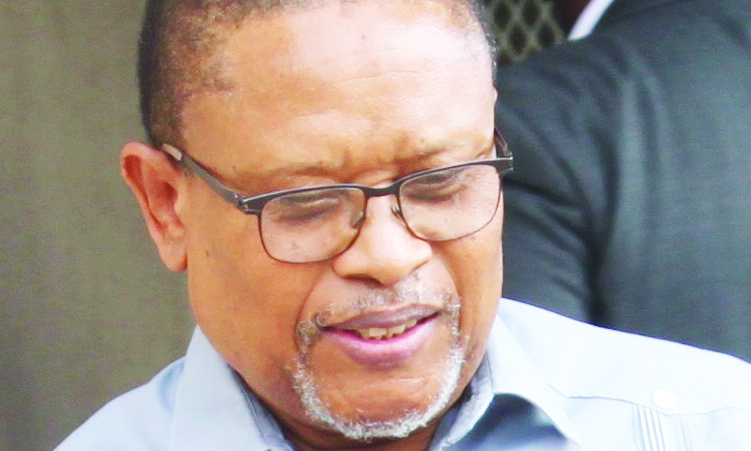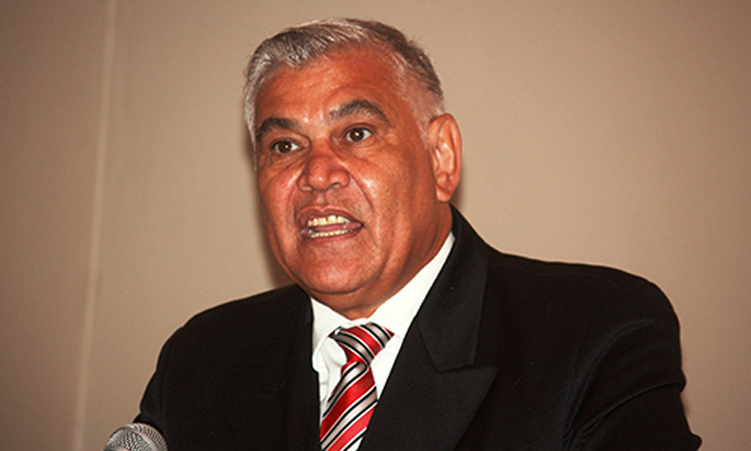Former minister of fisheries and marine resources Bernhard Esau says the charges levelled against him in the Fishrot fraud, corruption and racketeering trial are “outrageous and malicious”.
Esau made this comment after a charge of fraud in which the state alleges he was involved in the fraudulent allocation of fishing quotas valued at N$150 million was put to him in the High Court at Windhoek Correctional Facility yesterday.
He made a similar remark when a charge of fraud in the form of tax evasion was put to him and acting judge Moses Chinhengo asked him if he understood the charge.
“It’s so malicious and outrageous,” Esau said. He added: “There is a hidden agenda behind these charges.”
Esau told the judge that although he is not represented by a defence lawyer currently and noting his constitutional right to receive a fair trial, he is pleading not guilty on those charges.
Former attorney general and justice minister Sacky Shanghala also voiced criticism about the charges during plea proceedings before Chinhengo yesterday.
The charge in which the state is alleging that horse mackerel quotas amounting to 50 000 metric tonnes and with a market value of N$150 million were fraudulently allocated to the company Namgomar Pesca Namibia is “nonsensical” and “doesn’t make sense in law or logic”, Shanghala commented, before telling the judge again that he is disputing the court’s jurisdiction to conduct a trial.
On an alternative charge under the count of fraud – the alternative charge is one of conspiring to procure fish quotas fraudulently – Shanghala commented: “It goes from crazy to crazier. Rubbish.”
Shanghala also said he has objections to all of the prosecution’s charges. “I have fundamental issues with the story and the narrative taken in this indictment,” he said.
Shanghala continued: “I’m objecting to the entire charge sheet. It’s stories by people who don’t know what they’re talking about.”
Chinhengo noted pleas of not guilty on Shanghala’s behalf on the three charges that deputy prosecutor general Cliff Lutibezi read out to the accused and on which Chinhengo asked them to plead yesterday.
Shanghala, James Hatuikulipi and Pius Mwatelulo told the judge they are pleading that the court does not have the jurisdiction to try them.
That plea is based on claims by them that Chinhengo’s appointment as an acting judge in April last year was unlawful and unconstitutional.
One of the other accused, Ricardo Gustavo, told the judge he is unable to plead to the charges, as he does not have legal representation currently.
Chinhengo recorded pleas of not guilty on behalf of Hatuikulipi, Mwatelulo and Gustavo as well.
One of the other accused, Tamson Hatuikulipi, who is Esau’s son-in-law, pleaded not guilty on the charges read by Lutibezi.
In the fraud charge on which Shanghala, Esau, Gustavo, James Hatuikulipi, Tamson Hatuikulipi, Mwatelulo and corporate entities and trusts represented by them were asked to plead, the state is alleging that they “were operating as a syndicate with the objective of accessing fish quotas while they were not right holders in terms of the provisions of the Marine Resources Act”.
The state is also alleging that they used a memorandum of understanding signed by Esau and the Angolan minister of fisheries to have horse mackerel quotas totalling 50 000 tonnes, with a market value of N$150 million, allocated to Namgomar Pesca Namibia, and that the proceeds from the sale of those quotas were to be distributed among the accused.
In the charge of fraud in the form of tax evasion, the state is alleging that Shanghala, Esau, Gustavo, James Hatuikulipi, Tamson Hatuikulipi, Mwatelulo and corporate entities and trusts represented by them failed to declare the income of Namgomar Pesca Namibia amounting to about N$30.2 million to Namibia’s tax authorities and that the company evaded paying about N$9.7 million in tax as a result of that alleged fraud.
The plea proceedings are scheduled to continue today.
Stay informed with The Namibian – your source for credible journalism. Get in-depth reporting and opinions for
only N$85 a month. Invest in journalism, invest in democracy –
Subscribe Now!





